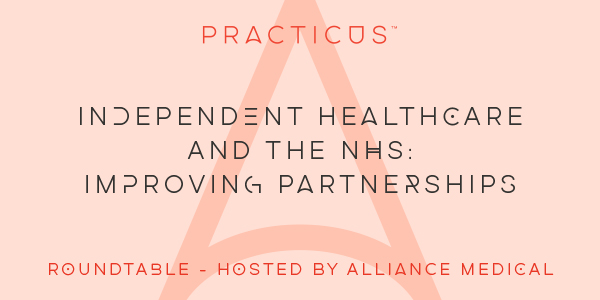Independent Healthcare and the NHS: Partnerships
by Carl Stevenson
At the end of 2018, Practicus coordinated a roundtable – hosted by Alliance Healthcare – that brought together leaders from independent healthcare providers and the NHS. It’s focus? To look at creating more effective partnerships.
It’s difficult talking about partnerships between the private and public healthcare sector. Throughout the seventy years of the NHS, it has always been controversial. Of course, services like dentistry, optical care and pharmacy, have been provided by the private sector for many years and technically, most GP practices are private partnerships. This much is fairly forgiving territory to discuss. But when the topic touches on outsourcing, the giving of contracts to the private sector to run NHS services, there’s a very different level of sensitivity. This roundtable wasn’t about increasing the privatisation of the NHS. But it was about looking at opportunities for the two sectors to partner more effectively under current strategy and policy.
What does partnership mean?
“Partnership” is often accused of being a throw-away term. It’s no different in healthcare, as one Managing Director commented on the day, “There are so many contracts that present purport themselves as an opportunity to partner but when you scrape back the bid documentation and project materials, you find it’s usually just a supply contract.” So we spent some time defining what we all meant by partnership, here’s a selection:
- “Partnership is the collaboration, that which creates added-value beyond transactional supply.”
- “It’s what you do together to make new things happen, identify opportunities and help solve each other’s problems beyond the contract.”
- “It’s people who understand each other’s agenda. Healthcare is a people business.”
- “Partnership is about good customer relations, there’s something about the relationship that is looking to the future, not just the ‘now’.”
- “I’m not going to use the term partner. I prefer evolving relationship. I got sick of it in the 90s, people saying they want to be my partner when really, they just want to take my money away from me.”
Identifying opportunities for partnership
While some on the independent healthcare side were pessimistic about increasing opportunities for true partnering with the NHS, others were upbeat.
Integrated care and whole system thinking
Many attending, particularly those from the NHS, believed changes towards integrated care and whole system thinking were actively increasing the opportunity for partnership with the independent sector as well as amongst NHS organisations:
- “We [the NHS] need to focus on system outcomes and that means a partnership environment by its very nature.”
- “Increasingly, the opportunity for partnership is about integrated care. And I’d completely agree with the earlier point about rivalry in the NHS. The problem that we have as an NHS is that integrated care is not really attractive to the boards of many trusts. It’s asking them to embrace the idea that ‘we’ll do this and at some point we’ll no longer exist’. The ACSs which will evolve from the STPs and have decision-making power, I think they should be saying to you, ‘Come and help us build these partnerships’. Not to sell diagnostics but come and help us build the partnership.’”
- “I’d agree with that. As an industry, independent healthcare has a skillset as brokers that NHS organisations don’t have but need. Often I found our role is to be the Henry Kissinger, negotiating peace and productive working relations between NHS clients.”
- “In terms of partnership, I think it’s the smaller trusts that you want to be talking to, not the bigger trusts with all their resources.”
- “I wonder if STPs actually know what partnership is like. It’s a genuine question. There can’t be many examples the people within them have seen. Actually, we should put together examples to show them about what partnership can achieve. Bring reference points to them in an open conversation.
Leverage the data
Several in the room believed that the ability of independent providers to pool data from across locales and countries is powerful, both for unearthing opportunities and to enable strategic commissioning decisions with confidence:
- “The PET-CT contract for us was a bold decision by NHS England that was made possible through data. How did that relationship start? Well, the bid said we’d like a PET-CT service. We provided the evidence of inequality for patients, it was a complete lottery. We then presented the Christie and the evidence to the commissioner and said we can only do this with the support of local NHS Trusts, all of which are now gain training from the Christie in return.”
- “We have to bring data evidence and analysis to unearth opportunities. The more local the better and from the start. We use the data to work out what is a safe place for the STP to be radical. Because often the valuable change is radical but all decisions tend towards playing it safe because the decision doesn’t have evidence to form its basis.”
- “I’d agree with looking at the data. To give you an example, we have the largest data set of lung cancer in Europe, if not the world. 80% of ‘presents’ are through A&E, we know that means a 12 month survival on average. There’s an opportunity to get this disease much earlier, to diagnose it faster.”
- “We actually had a case with a bid that wasn’t very collaborative. We won it but immediately went back in and asked about joint collaboration. We were able to convert it into more of partnership on merit. We had the evidence and research to show the benefit this would bring to them and for us, it’s a much better way of working.”
Expertise with capital
Others looked not to the independent sectors skills in brokering but rather their expertise around capital and ability to deal with financial institutions:
- “Here’s a real example of how we do it. Create a 22 year lease, in return for that income generated you get back the money to build the building. Done right, there is usually money left over. In fact, for one hospital, it was £5m that we then put back into the trust to build their next project. That’s the kind of things the private sector can make happen for the NHS. The NHS doesn’t have this level of expertise around capital, and for them the level they do have is gradually eroding.”
Cautionary note on outsourcing:
- “We are known as an outsourcing company in the NHS. But, in the 30 or so years we’ve been going, nothing has ever been outsourced to us. Or to be clearer, no existing service has ever been transitioned to us.”
- “As an independent provider, you can only really change patient outcomes within the NHS by bringing something in rather than taking something out. As soon as someone starts screaming ‘privatisation’, it always ends. We all know some high profile examples of that. True outsourcing is not an opportunity in the NHS.”
What makes for a good partnership?
The main recurring theme for making a good partnership was governance, in particular joint-governance:
- “Governance is the key to the gluing of the partnership. Where it works well, there is at least one representative of the commissioner on the governance committee.”
- “We built the largest standalone diagnostics centre. Everything under once ceiling and altogether. But the key to it working is the joint governance.”
- “When you say governance, everyone thinks clinical governance but actually it is and should be corporate governance as well – that actually underpins effective clinical governance.”
A clear opportunity for improvement, suggested with significant support around the room, was that, “Governance has been pushed down to about lab level purely clinically focussed and it needs to be a priority at a higher and more encompassing level. We’ve got to try and drag it out and back up in the relationship.” The point here was not that clinical governance is of low importance but rather that governance of all types should have a higher priority in the relationship and it should be more than just the clinicians involved.
There was also several who noted that contracts had to be even handed in order for partnership to flourish:
- “You’ve got to look at weighting on a long-term contract. If the contract is too weighted to you, you might get away with it for a year or two but after that the resentment is really building up. When it comes to contract renewal, well if it’s a well-weighted contract you’re renewing your vows, if it’s too much in your favour then you’re going to Relate.”
- “I also agree with the earlier point that you don’t sign deals that are too weighted to you. Everyone knows within ¾ years and it becomes toxic.”
Equally, honesty and openness are key:
- “Someone who’s undertaking partnership discovers quickly that it requires honesty about what’s driving them or it just doesn’t work.”
Research is often critical:
- “I worked at a pharma company years ago as a bid leader. We were the first to get a particular type of drug through NICE for use nationally. But the reality was there were lots of places we couldn’t get into. I sat down with the leaders of these health economies. Research was the key. Through research, we were able to get across the benefit of the drug and evidence that benefit.”
The importance of clinicians to establishing a partnership
Everyone agreed on the importance of the role of clinicians in establishing a true partnership:
- “Talking to NHS CEOs and senior management, I find a real lack of buy-in to partnership.”
- “It was critical to get clinicians involved in any real partnership I’ve even been involved with because often partnership means a long-term contract. The CEOs are important to work with but they move on too quickly. Both clinicians and executives are very guarded but the differences is that when the clinicians are persuaded of the benefit things really move, whereas if it’s just the CEO, you’ve not really got anywhere yet.”
- “I also agree about the turnover of CEOs. If it takes two years or longer from initial approach to getting a deal then you’re going to find yourself restarting that process again and again.”
- “But there will be people there who’ve been there 30 years who can help prevent that from happening. Typically clinicians.”
- “In terms of NHS rivalry. The private sector hasn’t always understood what was driving that behaviour between trusts. The best managers to be working with are often a clinician who is a manager. They see a bit further past the rivalry.”
- “You need to be careful though. I’ve seen from within the NHS how clinicians can also stop the best deals going ahead. Either way, you need to have them on side.
- “An example of the power of clinicians from my experience is a national a scheme around early intervention that was supported meticulously with evidence but it didn’t work because of cultural resistance to the programme at a clinical level.”




